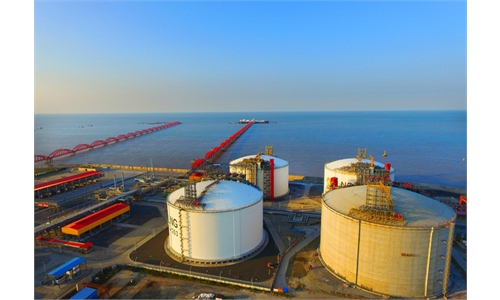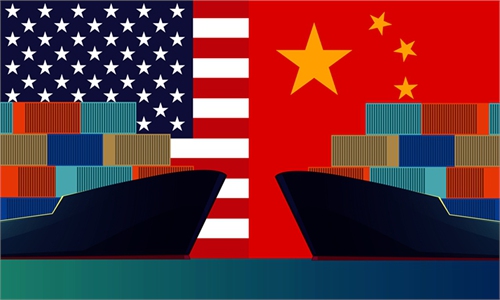
Photo shows the Jiangsu LNG Project of China National Petroleum Corporation at Yangkou Port, East China's Jiangsu Province. Photo: VCG
As China's energy transition progresses, its demand for natural gas is expected to steadily increase over the coming years, which may inject new impetus to global energy cooperation, which could make China and the US to strike for a return to normal bilateral relations.
US exporter Venture Global LNG inked two 20-year deals with Chinese state oil giant Sinopec on supplying a combined 4 million tons of liquefied natural gas (LNG) a year, according to a Reuter report on Wednesday, citing documents on the US Department of Energy website. Venture Global also signed a deal with Unipec, the trading arm of Sinopec, to supply 1 million tons of LNG for three years, showed a separate document posted on the US government website.
Last week also came news that Chinese natural gas distributor ENN Natural Gas Co signed a 13-year deal to buy LNG from US supplier Cheniere Energy Inc, starting in July 2022.
Compared with China's annual LNG imports, which exceeded 100 million tons in 2020, these new deals don't represent very big purchase volumes. But considering that it is the first time since 2018 that these major LNG deals were inked between Chinese and US companies, it is a positive development when it comes to energy cooperation between the two countries.
At present, due to broader energy supply dearth and stronger-than-expected energy demand across the world, energy prices are skyrocketing. But it should be pointed out that the new deals will not have much impact on China's recent efforts to meet energy demand this winter because the US currently has little ability to export LNG due to its logistics snags and other factors.
If anything, China's growing demand for natural gas is a main reason behind the new deals. During the process of the Chinese economy shifting from fossil fuel to green energy, natural gas is the only suitable transitional fuel source considering its production volume, and smaller CO2 emissions footprint, the convenience of its usage, its affordability and the security of supplying the fuel to the public.
China is forecast to overtake Japan as the world's biggest buyer of LNG this year, and its market is set to continue to expand in the years to come.
From the US perspective, the country became a net exporter of natural gas in 2017, and with its domestic production capacity expanding, its LNG output will continue to rise. This could explain the US efforts to explore export market for its LNG in recent years, but, the country is at a cost disadvantage compared with Russia and other natural gas exporters. In this sense, the potential for energy cooperation with China will be crucial for the US in the long run.
Also, to a certain extent, Chine's energy diversification push offers a good opportunity for reducing trade imbalances between China and the US.
The US should take more responsibility for the imbalance in bilateral trade, which requires greater efforts from the US side by removing all trade barriers, including export of high-tech products to China.
If the US doesn't make positive efforts to promote the development of bilateral ties, the momentum behind China's pursuit of energy cooperation with the US will go nowhere. Bearing in mind that China has multiple LNG provider choices.



